当代高职高专英语(高教版 第二册)授课教案:Unit 5.2
当代高职高专英语教案第二册Unit 5

Unit FiveTeaching PlanPersonalityTeaching ObjectivesIn “Part 1:Listening & Speaking”, listen and recognize adverbial clause of the time, short dialogues and passages.Learn how to make short conversations with people on some familiar topics, e.g. dinner out.In “Part 2: Reading”, know the power of personality.Master usages of some common words, phrases and structures, e.g. candidate, emphasis, description, analytical, reveal, transform, understate, clarification, convince, trait, get... across, on the spot, end up, hit the ground running, pride oneself on / upon, psychological, counselor, hospitable, perspective, take into account, have sth. in common… …In “Part 3: Translation & Writing”, understand the method of translating appositive clause.Learn how to write a letter of thanks.In “Part 4: “Grammar”, master the usage of verb (transitive verb,intransitive verb,link verb,auxiliary verb).In “Part 5: “Further Development”, do more oral and written work to consolidate what you have learned in this unit.Teaching ProceduresLead InCultural Background or Related InformationEveryone brings along his own personality. The personality has a profound effect on the quality of work and on professional development.The mind frame, the inner attitude, the specialized knowledge, the ability, the aura and the level of energy are all part of the personality of the individual person. These qualities are affected by systemic influences and energies of different surrounding or inner systems.Generally speaking, your personality is considered to be the totality of character attributes and behavioral traits that you possess. Your personality will differentiate you from another person, such as your spouse, personal friend, neighbor, associate at work, and others. The type of personality you develop through the stages of life canadversely or positively affect your current life situation or future plans. Factors such as individual attributes, social attributes, how what you don't know can affect you, the keys to success from developing your personality, among others, will be of interest to you.People who are really successful in life will undoubtedly have different personality characteristics, but they are neither too introvert nor extrovert. In many cases, normal people (those without medical, psychological or psychiatric personality disorder problems requiring professional treatment) will tend to display tendencies that are both introvert and extrovert at times. But the positive attributes are still necessary for their real substantial success. Some professionals want us to know that successful people certainly share a set of common personality characteristics. Therefore, our personality can positively or adversely affect our lives and success. Good positive attributes can only help us achieve our goals in life. The negative factors in our personality will hinder us from a better relationship and life's success.Part 1 Listening & SpeakingListeningScripts and KeysActivity 1 Adverbial Clauses of TimeDirections: In this part you will hear 10 sentences. In each sentence there is an adverbial clause of the time introduced by words like WHEN, BEFORE, AFTER, etc. Try to use these words to find out which of the two actions in each sentence occurs first and then mark your answer.1. I didn’t go to bed until Susan came home.B. Coming home.2. I’ll go to the bookstore after sending the letter.B. Sending the letter.3. As soon as it stops raining, we’ll start our match.A. Stopping raining.4. Once he arrives, we will set off.A. Arriving.5. When we arrived at the station, the trained had left.B. Leaving.6. Use your head and you’ll find the answer.A. Using the head.7. He has changed a lot since he failed an exam.B. Failing an exam.8. Go to the bank when you finish your letter.B. Finishing the letter.9. Mary worked in a fast-food restaurant before she set up her own company.A. Working in a restaurant.10. Give me a ring as soon as you arrive at the airport.B. Arriving at the airport.Activity 2 ConversationsDirections: In this part you will hear 5 conversations. Each of the conversations will be read twice. Listen carefully and then decide whether the statements below are true, false or not mentioned according to the conversations you hear. Write T for True, F for False and N for Not Mentioned in the spaces provided.Conversation 1A: Are you ready to order?B: Yes. I’d like a roast steak.A: How would you like it done?B: Well done, please.A: Anything to drink?B: A glass of orange juice.A: May I bring you a salad?B: What do you recommend today?A: I recommend Garden Salad with vegetables and cheese.B: Garden Salad is fine.F The waitress recommends the roast steak to the man.Conversation 2A: Hello, Spring Restaurant. Can I help you?B: Yes. I’d like to book a table for tonight.A: Yes, sir. What time?B: 8:00.A: Sure. For how many people?B: There are four of us. We’d like the table by the window.A: OK. Four people. The table by the window. May I have your name?B: Donald Peterson.T The man is making a reservation at a restaurant.Conversation 3A: It’s a nice place to eat, Mike. The service here is excellent.B: Certainly. I come here often.A: But it seems a little bit expensive.B: Oh, don’t worry about that. It’s on me.A: That’s not what I meant!B: It’s my treat today. Waiter, can I have the bill, please?N The speakers are having a blind date.Conversation 4A: What can I do for you?B: I’ve been trying to catch your attention for at least 15 minutes.A: Yes, madam?B: This meat’s raw! I told you I wanted it well done.A: I’m terribly sorry. I made a mistake.B: And the fish is too salty.A: Sorry, I’ll tell the kitchen to change them for you.T The woman is complaining about the food.Conversation 5A: What will we have for dinner?B: I don’t know. The fridge is empty.A: Well, why don’t we eat out for a change? Let’s go to McDonald’s.B: Oh, no. My appetite for hamburgers has disappeared. I’ve heard about a new Korean restaurant. It’s just a 15-munite walk away. Let’s go there.A: I don’t like Korean food. It’s too spicy.B: Then how about Pizza Hut?A: Pizza Hut would be fine. And it is near the cinema. After dinner, we can go to see a movie.F The speakers finally decide to go to the cinema instead of the restaurant.Activity 3 PassageDirections: In this part you will hear only one passage. At the end of the passage, 5 questions will be asked about what was said. Both the passage and the questions will be read twice. An incomplete answer is written for you. When you hear a question, you should complete the answer with a word or a short phrase (in no more than 3 words).Carefulness and carelessness are as different as fire and water. But strangely enough, many scientists have both these qualities, that is, they are both careful and careless. Newton, the famous English scientist, was such a person.Once, Newton invited a friend to dinner at home. When they were ready to eat, Newton left to get a bottle of wine. But after his friend had waited for a long time, Newton still did not come back. Finally his friend found Newton in his lab. The reason was that when Newton was going to get the bottle of wine, he suddenly had a new idea for the experiment he was doing, so he completely forgot his friend and the dinner. There was another time when Newton was leading ahorse up a mountain, holding the rein in his hand. While he was walking, he kept thinking of the problems he had met in his studies. When he got to the top, he found that the rein wasn’t in his hand and that the horse was gone.Many scientists are careless about how they live. This is because they are too careful in their studies.Questions and Answers1. Q: What qualities do many scientists have according to the passage?A: They are both careful and careless.2. Q: Why did Newton leave the room when he and his friend were ready to eat?A: Because he left to get a bottle of wine.3. Q: Why didn’t Newton go back to the dinner?A: Because he suddenly got a new idea for his experiment.4. Q: What did Newton do when he was leading a horse up a mountain?A: He kept thinking of the problems.5. Q: Why are many scientists careless about their life?A: Because they are too careful in their studies.SpeakingActivity 1✐Samples—— A: Are you ready to order?B: Yes. I’d like a roast turkey with vegetable and potato.A: How would you like it done?B: Medium, please.A: Anything to drink?B: A cup of coffee.A: Would you like any dessert?B: What do you recommend today?A: Cherry pie is on special this week. If you order two cherry pies, you can save 50 cents.B: Really? In that case, please bring me two cherry pies.Activity 2✐Samples—— A: Oh, I don’t like to cook supper tonight. Why not eat out for a change?B: That sounds like a good idea. Let’s go to KFC.A: Oh, no. I am fed up with junk food. They spoil my appetite.B: I’ve heard about a new Japanese restaurant. The seafood there is said to be delicious.A: Really? Do you mean the newly opened restaurant near the Clinton Park?B: Yes. After eating there, we can also take a walk around the park.A: OK. Let’s go.Part 2 ReadingLead-in Activity: Discussion✐Samples1. —— I am a man of few words. When I want to express my feelings, I tend to use facial ex-pressions and body language instead of talking for a long time. Sometimes people may get the impression that I am a cold person just because of my silence. After they get to know me, however, they will regard me as a friendly and passionate guy. I am also very optimistic about things and believe in faith rather than in science.—— I am an outgoing girl. I love to make friends and tell everything to them including things regarded as “skeletons in the closet”. Some of my classmates think I am shallow, but I think I am just straightforward. As happy as I appear to be, I always feel sad because I am used to looking on the dark side when I see things. For all these years I have been trying to become a happier and more active person, but little progress has been made.2. —— I think personality is more important to a person’s success. As we know, “A man’s char-acter is his fate.” Personality contributes greatly to a person’s success or failure. If a person’s personality type suits his or her career, then success will come sooner or later.—— Although many people think that personality determines one’s fate, I believe that hard work is in fact the most important factor in determining whether one’s going to succeed or fail. No matter what kind of personality you’ve got, as long as you’re willing to work well, you will succeed some day. As the old saying goes, “As a man sows, so he shall reap.” In a word, I believe hard work is far more important than personality.Language Focus1. “How would you describe your personality?” (Para. 1)would用于委婉地提出问题。
中职《英语基础教程》第二册Unit5-2

Unit 5 I think it s tome to have a change.第二课时教学设计)一、教材分析1.教学内容本课时系教材《英语基础教程》(2)第五单元的第二课时,包括Reading and writing部分,具体内容为:了解关于“电脑迷”和“电视迷”背后的故事和对健康生活的建议;能根据关键句型写出建议;能够正确对待自己的不健康习惯,并有意识的改变;同时也渗透了英美文化。
2.教学重点、难点⑴教学重点掌握重点词汇和短语;学生能通过阅读,读懂有关“电脑迷”、“电视迷”的内容,提高获取相关大意和细节信息的能力;培养学生阅读并整合信息的能力,而且能读以致用,通过阅读能写出改进健康习惯建议的小文段。
⑵教学难点灵活正确使用描述“电脑迷”、“电视迷”和生活习惯的相关句型;能根据关键句型写出改进健康习惯建议的小文段。
二、教学目标1. 知识目标⑴掌握健康故事的相关词汇,女口:artist, common, couch, describe, handbook, mouse, official, screen, snack, unusual, couch potato, mouse potato⑵掌握描绘生活习惯的句型,如:A ... enjoys …You should …… .is bad for your health.2. 能力目标⑴能看懂关于“电脑迷”和“电视迷”背后的故事和对健康生活的建议;⑵能写出改进健康习惯建议的小文段。
3. 情感目标能够正确对待自己的不健康习惯,并有意识的改变;能了解英美文化趣事三、教学步骤Step One Lead-in1. Revision : Have the students to list the healthy and unhealthy lifestyle as much as possible.(设计意图:通过复现短语,让学生巩固所学知识,在轻松的氛围中复习所学短语,为后面熟练准确的运用做好准备。
高职高专英语教案(第二册)
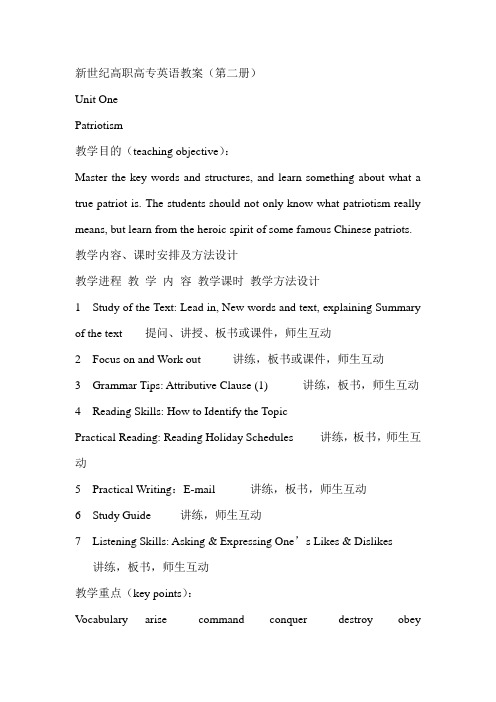
新世纪高职高专英语教案(第二册)Unit OnePatriotism教学目的(teaching objective):Master the key words and structures, and learn something about what a true patriot is. The students should not only know what patriotism really means, but learn from the heroic spirit of some famous Chinese patriots. 教学内容、课时安排及方法设计教学进程教学内容教学课时教学方法设计1 Study of the Text: Lead in, New words and text, explaining Summary of the text 提问、讲授、板书或课件,师生互动2 Focus on and Work out 讲练,板书或课件,师生互动3 Grammar Tips: Attributive Clause (1) 讲练,板书,师生互动4 Reading Skills: How to Identify the TopicPractical Reading: Reading Holiday Schedules 讲练,板书,师生互动5 Practical Writing:E-mail 讲练,板书,师生互动6 Study Guide 讲练,师生互动7 Listening Skills: Asking & Expressing One’s Likes & Dislikes讲练,板书,师生互动教学重点(key points):V ocabulary arise command conquer destroy obeyresist risk sacrifice scenerybe bound to do carry out hand down in the hour of at the mercy of yield to hand on to the lastall the more obedience to in spite ofStructure In order that as well asPractical Reading Reading Holiday SchedulesGrammar Attributive Clause (1)Listening and Speaking Asking & Expressing One’s Likes & Dislikes教学难点(teaching difficulties):1. Understand every sentence correctly in the text; eg. The answer is that nowhere in such countries have men been found… Why is it that some other nations disappeared?2. the usage of some special expressions:in order that …; It is …that/ who教学方法(teaching methods):课文以启发式提问导入,采用讲授法。
职高英语第二册5单元教案
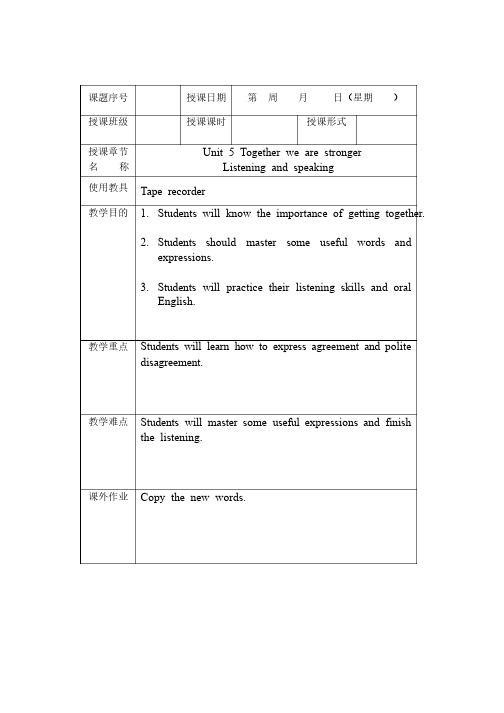
课题序号课题序号授课日期授课日期 第 周 月 日(星期日(星期 ) 授课班级授课班级授课课时授课课时 授课形式授课形式 授课章节授课章节名 称 Unit 5 Together we are stronger Listening and speaking 使用教具使用教具Tape recorder 教学目的教学目的1. Students will know the importance of getting together. 2. Students should master some useful words and expressions. 3. Students Students will will will practice practice practice their their their listening listening listening skills skills skills and and and oral oral English. 教学重点教学重点Students Students will will will learn learn learn how how how to to to express express express agreement agreement agreement and and and polite polite disagreement. 教学难点教学难点Students Students will will will master master master some some some useful useful useful expressions expressions expressions and and and finish finish the listening. 课外作业课外作业Copy the new words. 教学步骤教学步骤 教学内容教学内容 教学方法及双边活动边活动 Step 1 Step 2 Step 3 Step 4 teacher will ask some questions by showing showing video and pictures. Let students video and pictures. Let students to compare the two pictures. Do you work together or work solo ? Show Show the the the importance importance importance of of of getting getting getting together together in in a a a team: team: team: team team team =together =together =together + + + everyone+ everyone+ achieve+ more. Teacher will will list list list some some some items items items to to to let let let the the students choose: Have the same aim/have no aim: Work together/work solo ; Help each other/ helpless, ect. Listen to the conversation and tick (∨)what )what’’s s being being being talked talked talked about. about. Before listening: teach some new words in the listening material. While listening: Ask the students to pay more attention to the key words in the listening material. After listening: let the students say out their answers and reasons. If possible, let them listen again. Ask students to repeat after the the tape and tape and try to understand the listening material. Ask Ask students students students to to to learn learn learn how how how to to express the disagreement in different ways as many as they can . Our work styles clash First First , , , teacher teacher teacher should should should teach teach teach the the the students students the the new new new words. Teacher can ask students words. Teacher can ask students to to look look look at at at the the the pictures pictures pictures and and and bring bring bring out out out the the Step 5 Step 6 new words. Help the students to understand the new words and master the pronunciation of these words, Do some exercise Before listening: True or false : Let students to go over the four four sentences to sentences to get the main information. Teacher can help Ss analyze the key words and ask them to read by themselves. While While listening: listening: listening: remind remind remind Ss Ss Ss to to to catch catch catch the the key words, especially the relationship between the four main people : the man, the woman (Betty), Leo, Emma. After listening: listening: check check the the answers answers if possible, listening again. Homework Ask Ask students students students to to to listen listen listen more more more and and and speak speak more after class. 授课主要内容或板书设计授课主要内容或板书设计Uint5 Together We are strong Warm-up: listening and speaking There’’s no I in a team. ThereUnity is strength. Y ou may be strong, but we are stronger. I understand your concern. That may be, That’’s how I saw it. ThatI’m afraid we just don’t see eye to eye on this . Together we can, together we win. Many hands make light work.课题序号课题序号授课日期授课日期 第 周 月 日(星期日(星期 ) 授课班级授课班级授课课时授课课时 授课形式授课形式 授课章节授课章节名 称 Unit 5 Together we are stronger Reading and Writing 使用教具使用教具Tape recorder 教学目的教学目的1. Students will learn some useful words and expressions. 2. Students should develop their basic skills of listening , speaking , reading and writing. 3. Encourage students to combine what they learned learned with with their own experience, their interest and points so as to see if they have a good team. 教学重点教学重点1. Students Students should should should have have have a a a good good good comprehension comprehension comprehension of of of the the passage. 2. Students will train their reading strategies.教学难点教学难点Students will master some useful words and expressions 课外作业课外作业Write down a passage about teamwork. Remember some useful language points 教学步骤教学步骤教学内容教学内容 教学方法及双边活动活动 Step 1 Step 2 Step 3 Step 4 Lead in Think Think about about about a a a time time you worked in in a a team team to to to complete complete complete a a task. task. What What What role role role did did you play in the team? Read the passage and circle the correct answer. Ask Ask students students students to to to read read read the the the passage passage passage quickly quickly quickly and and master master the the the main main main idea idea idea of of of the the the passage. passage. passage. Teacher Teacher should teach some words : diary, story , interview. Before Before reading, reading, reading, teacher teacher teacher can can can help help help students students students to to analyze and predict the main idea of the passage while teaching some new words. Then let the students read the passage and the questions in the exercises. Encourage them to find find out out out the the the answers answers answers to to to the the the questions questions questions while while reading.\ Complete Complete the the the passage passage passage with with with the correct words the correct words from the box. Two aims of the activity: to get the students to master the important phrases; to get the students to understand the text better. Teacher can guide the students to have teamwork and ask and answer some questions. Emily is an intern at the Royal Restaurant. She has has been been been assigned assigned assigned to to to make make make a a a questionnaire questionnaire questionnaire to to collect customers ’ comments on their fook and service. Please help her to design the questins. Step 5 First, First, teacher teacher teacher ask ask ask students students students to to to read read read the the the suggest suggest about about the the the questionnaire questionnaire questionnaire and and and let let let the the the students students know know how to make how to make a a a questionnaire. questionnaire. questionnaire. Then Then Then the the students students can can discuss in groups and try try to to design the questions. Next, Next, get get get the the the students students students to to to write write write the the the passage. passage. They can work in groups to finish writing. Homework Ask students to finish off the workbook exercises. 授课主要内容或板书设计授课主要内容或板书设计Unit 5 Together We are stronger Team player Call for Not see eye to eye with sb. Go off Team up Go without saying Rather than Work out On one’s own Soft skill Point of view In detail 课题序号课题序号授课日期授课日期 第 周 月 日(星期日(星期 ) 授课班级授课班级授课课时授课课时 授课形式授课形式 授课章节授课章节名 称Unit 5 Together We are stronger Real life skills and further reading 使用教具使用教具common 教学目的教学目的1. students will train the skill of how to describe things 2. students students should should should learn learn learn to to to cooperate cooperate cooperate with with with the the the others others others in in his team. 教学重点教学重点Students will learn learn how how how to to to get get get along along along with with with their their their teammates teammates and how to work with them教学难点教学难点Students will finish the exercises in the workbook. 课外作业课外作业workbook 教学步骤教学步骤 教学内容教学内容 教学方法及双边活动活动 Step 1 Step 2 Step 3 Step 4 Revision Review Review some some some useful useful useful words words words and and and expressions expressions in last class. Eg: That may be, That That’’s how I saw it. I ’m m afraid afraid afraid we we we just just just don don don’’t t see see see eye eye eye to to eye on this . Together we can, together we win. Activity: Activity: form form form teams teams teams of of of five. five. five. Each Each Each team team team is is supposed supposed to cross to cross over over an an an open open open area without area without touching the ground. Choose two items out of the the given given given options options options and and and discuss discuss discuss how they how they may help you achieve your goal. Before Before game, game, game, get get get the the the students students students to to to know know know the the rules of the game and how to use the tools. Activity: Activity: now now now work work work together together together with with with your your your team team members members to to to get get get across across across the the the open open open area. area. area. Note Note down the tools and the time each team used to complete the task. Students can play the game on the playground. V ote and decide which team works most effectively. effectively. Then Then Then discuss discuss discuss in in in your team: your team: What could you have done to perform better Step 5 Further reading Students Students make make make the the the questionnaires questionnaires questionnaires and and and teacher teacher can help them with some difficult phrases. 授课主要内容或板书设计授课主要内容或板书设计Unit5 Together We are better Quite agree partly agree somewhat agree Partly disagree completely disagree ……Show respect to……Support my team members’ personality Compete with my fellow members Focus on Be in trouble Be willing to do Get along with Make it as easy as possible Ask for help。
高教中职版英语2(基础模块)教学设计unit 5
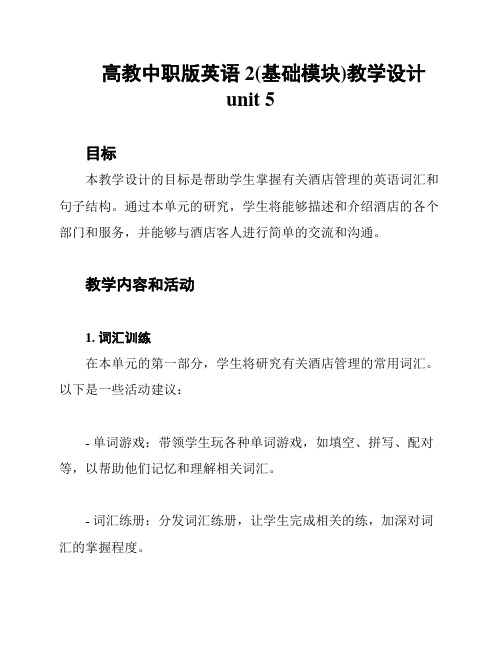
高教中职版英语2(基础模块)教学设计
unit 5
目标
本教学设计的目标是帮助学生掌握有关酒店管理的英语词汇和句子结构。
通过本单元的研究,学生将能够描述和介绍酒店的各个部门和服务,并能够与酒店客人进行简单的交流和沟通。
教学内容和活动
1. 词汇训练
在本单元的第一部分,学生将研究有关酒店管理的常用词汇。
以下是一些活动建议:
- 单词游戏:带领学生玩各种单词游戏,如填空、拼写、配对等,以帮助他们记忆和理解相关词汇。
- 词汇练册:分发词汇练册,让学生完成相关的练,加深对词汇的掌握程度。
2. 会话练
在本单元的第二部分,学生将研究如何用英语进行酒店管理方
面的会话。
以下是一些建议的活动:
- 角色扮演:学生分组进行角色扮演,演练酒店前台接待员和
客人之间的对话,加强学生的口语表达能力。
- 对话练:提供一些对话情景,让学生自己创造出相关的对话,并进行小组讨论和分享。
3. 阅读理解
在本单元的第三部分,学生将进行有关酒店管理的阅读理解练。
以下是一些建议的活动:
- 阅读理解练:提供一篇关于酒店管理的文章,让学生阅读后
回答相关的问题,检验学生对文章的理解能力。
- 讨论和辩论:根据阅读材料,引导学生进行讨论和辩论,提
高他们的思维能力和表达能力。
总结
通过本单元的学习和活动,学生将能够掌握有关酒店管理的英语词汇和句子结构,并能够进行简单的交流和理解。
本教学设计旨在提高学生的语言能力和实际运用能力,帮助他们在酒店管理领域取得更好的学习成绩。
中职英语高教版2021基础模块2 Part5 Unit2 Health and Fitness教案
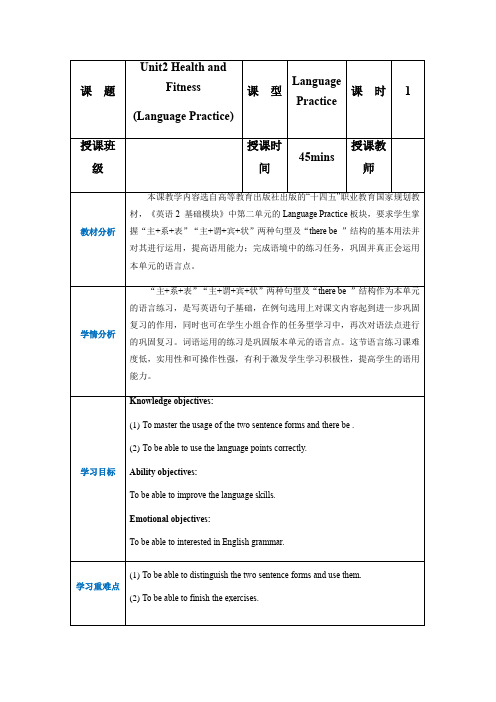
Vocabulary
1.Choose and complete.
Review the phrases to finish task18.
2.Read and complete.
Review the words to finish task19.
Finish thetask 18and 19 to review the useful words and phrases ,and review their original sentences in which they appear.
Step 2:
Grammar
1.Read and find.
1)Read the sentences to tell three different sentence forms
2)Make sure there sentence forms.
2.Read and classify.
Read the sentences to classify them and fill in the table form in task15.
本环节旨在训练学生使用学过得单词和短语完成相应的任务,复习原句的同时又增设了新的使用场景,检测学生语言的输入情况,更进一步检测输出能力。
Step4:
Summary
1.Grammar
1)主语+系动词+表语
2)主语+谓语+宾语+状语
3)“there be”结构
recover from recover
burn off handle
3.Read and reorder.
Write the right sentences in order to finish task 16.Tell the form of each sentence.
当代高职高专英语第二册电子教案_盛跃东主编

Unit OneLOVE1 Teaching ObjectivesA Understand the main idea of the textB Mater the key language points and grammatical structures in the TextC Training of basic reading, listening, speaking, and translation activities in the Text.2 Important points:A New words and expressionsB Text structure analysisC Structured writingD Listening and speaking3 Time AllocationText A :3 Text B: 2 Listening an speaking : 14 Language Focus1.John Blanchard stood up from the bench, straightened his Army uniform, and studied the crowd of people making their way through Grand Central Station. (Para. 1)stood up from the bench意为“从长凳上站起身”。
这里现在分词短语“making their way through Grand Central Station”作定语,修饰“the crowd of people”。
现在分词短语可在句中作定语,例如:1)Will the people sitting at the back please keep quiet?坐在后面的人请保持安静。
2)We shall arrive too late to catch the train leaving at eight.我们会到得太晚赶不上八点开出的火车。
最新中职英语基础模块2教案:Unit5

Unit 5 It’s time to change.(第三课时教学设计)一、教材分析1.教学内容本课时系教材《英语2》(基础模块高教版)第五单元的第三课时,包括Language in Use和Unit Task两部分。
这些内容总结了本单元的重要词汇、句型和语法,并在完成真实的任务中达到综合运用本单元所学语言的能力。
2.教学重点、难点(1)教学重点①通过在情境中学习,学生能正确使用宾语从句。
②通过句型操练,熟练掌握有关生活习惯的词汇和句型的用法。
(2)教学难点学生能够运用本单元所学的有关健康的语言知识完成一个真实的问卷调查任务,即在班级选举班级健康之星。
二、教学目标1.知识目标(1)学生能掌握表达喜好的原因的形容词,如interesting, boring, exciting…。
(2)学生能熟练运用询问健康生活习惯的句型,如:DoIt’s(3) 学生能识别并熟练运用宾语从句来转换话语。
三、教学步骤Step One Lead-in (22 min)Teacher tells students that today we will hold a health star competition to attract students’ attention.1.Discussion:Work in groups and discuss the habits of a health star in our class. For example:Go to bed early and get up early.3. First the Ss do the interview in their group, choose one health star, and after finishing the task, choose one Ss to go to other group to do the interview.4. Discuss the result of the interview and choose the studentwho has the healthiest habits.Step Two Grammar focus (22min)1.L ook and learnLet Ss get the general understanding the problems about Jason in pairs.3. SummarizeLet Ss summarize the general structure and basic usage of objective clause in this passage.结构:主语+ 谓语+ (that)+从句注意事项:①主句的谓语动词如果是过去式,从句的谓语动词要用过去的相应时态。
中职英语高教版2021基础模块2 Part5 Unit2 Health and Fitness课件

People may have mental health problems such as
1)d__e__p_r_e__s_s__io__n_in their lifetime. Yet, in spite of the common
recover
problems, many of us make no 2)_e_f_f_o__r_t__ to boost our mental health. We tend to 3)__ig__n__o__r_e__the emotional
即动作的承受者,才能使意思完整。这类动词叫做及物动词。
宾语位于及物动词之后,一般同主语构成一样,不同的是
02
构成宾语的代词必须是‘代词宾格’,如:me,him,
them等
状语:
状语修饰动词、形容词、
副词或全句,说明方式、
因果、条件、时间、地点、
让步、方向、程度、目的
等。
1
状语在句子中的位置 很灵活:句末,句首, 被修饰的词之前均可。
02
Find more examples about the three sentence form in the unit.
Thank You!
属另一类,表示变
化。
03
感官动词多可用 作联系动词: look well/面色 好,sound nice/ 听起来不错,feel good/感觉好, smell bad/难闻
句型 二: S V O (主+谓+宾)
此句型句子的共同特点是:谓语动词都具有实义,都是主语
01
产生的动作,但不能表达完整的意思,必须跟有一个宾语,
句型 一: S V P (主+系+表)
高教版中职英语(基础模块第2册)Unit5《It’stimetochange》word教案
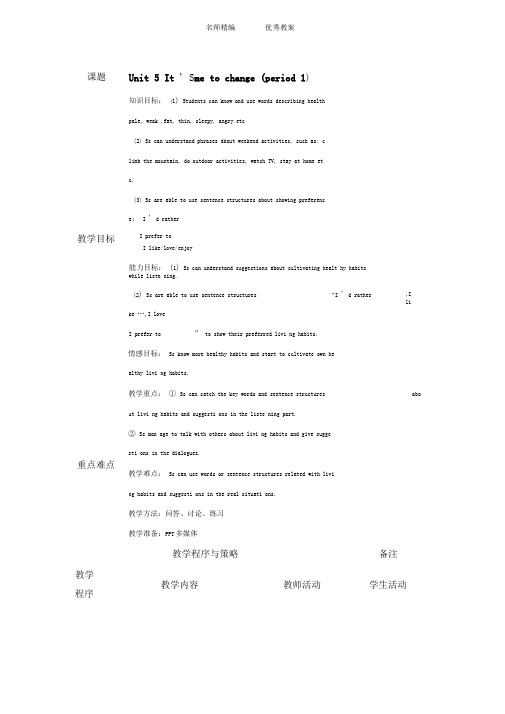
名师精编优秀教案Unit 5 It ' S me to change (period 1)知识目标:(1) Students can know and use words describing healthpale, weak ,fat, thin, sleepy, angry etc(2) Ss can understand phrases about weekend activities, such as: climb the mountain, do outdoor activities, watch TV, stay at home etc.(3) Ss are able to use sentence structures about showing preference:I ' d rather教学目标I prefer toI like/love/enjoy能力目标: (1) Ss can understand suggestions about cultivating healt hy habitswhile liste ning.(2) Ss are able to use sentence structures “I ' d rather ,Ili ke …,I loveI prefer to ” to show their preferred livi ng habits.情感目标:Ss know more healthy habits and start to cultivate own healthy livi ng habits.教学重点:① Ss can catch the key words and sentence structures about livi ng habits and suggesti ons in the liste ning part.② Ss man age to talk with others about livi ng habits and give suggesti ons in the dialogues.重点难点教学难点:Ss can use words or sentence structures related with living habits and suggesti ons in the real situati ons.教学方法:问答、讨论、练习教学准备:PPT多媒体教学程序与策略备注教学程序教学内容教师活动学生活动课题1. Pre-liste ningNow, there are twoAsking several students questions : stude nts Tom and about doing outdoor activities:ISara talking about Do you ofte n do outdoor activitiesIor do you often stay at home?!what they will doI IIthis weekend.I2. While-liste ning |I I(1) Listen and answer questions>I IListen to the tape for the first time an Id find out who will climb the mountai !■I n and who will stay at home this wee IStep One Lead -in 1. Simple greet ings and ask ing :questi ons to lead-i n the topic.IWhat did you do last weekend?2. Small discussi on weeke nd activities.about teacher's 'there are four peopI did five things last weeke nd.:Do you think which is healthy?; Which is unhealthy?If I eat too much ice cream, drink too :i much beer, what will happe n to me?---fat: le having problems in their health. Le t ' s look at picture If I do too much homework, what will I feel?---sleepy j s and find out whaIt are they?Step Two Wor d Stud y 1. 2.Match ing game;Let students choose the right j explain the meanin adjectives to describethe pictures ong of do more ou the screen.tdoor activities ” . FIor example, climbiDiscussi on and matchIDiscuss how they can keep healthy. |ng the mountain aIMatch the suggestions with the ! nd going boating apictures in Activity 1.j re outdoor activitieStudents work in in dividual s and the n c heck the an swers to gether.Step Thre e ListeningStep ken d.Two (2) Listen and completeReadi Students listen to the tape again and dng sk ecide whether the statements are trueills or false. If it is false, find out the reasons.(3) Listen and fill in the blanks. check it through thListen again, and fill in the blan e whole class.ks with the words in the box.3. Post-listeningStudents read after t1(1) Read and underline. he tape sentence by(2) Let Ss find out these sentences asentence, and thenind teacher lists sentence structures in t underline the sente he blackboard.nces showing preferien ces.1. Practice and act: talk about weekend activities in pairsStep(1) First teacher makes short dialogFou ues with several students. For exampl Act with several S Practice and act in r:1e:s as an example pairsSpea1T: What do you like to do on weekekingn ds?S: I like ........ , what about you?T: Well, I prefer to …1(2) Students make dialogues in pa Iirs, following the example. Then someof them act out their dialogue in front of the class.2. Discussion and make a report■*■ ■ ■■ ■ ■■■ HB■ HBStudents in groups of four discuss the :Iactivities which are bad for health an :I d talk about the reasons using learned :iiadjectives. Students make a report as :Ifollows:IIIReport: j Make an exampleII think ..... is unhealthy, because ............ .. ; for Ss to referenceiiSo I like/love/enjoy/prefer to .............. ;小结活习惯及描述健康状况的形容词词汇和表达习惯爱好的对话。
中职英语2教案unit 5

Unit 5 It’s time to change.第一课时Lead-in + listening and speaking教学步骤Step One Lead-in ( 4 min )1.BrainstormingTeacher : “What activities are good for your healthyWhat activities are bad for your healthy Students : Compete with each other group and writethe related phrases on the blackboard .(设计意图: 这是学生寒假回来的第一节英语课,和学生互相问候了之后,顺便聊到寒假后新的一年的改变是再自然不过的事了。
这里的开门见山让学生很快进入了本节课的话题。
激活学生已有的词汇知识;通过回忆一些有关健康的活动词汇,启发学生的主动思维,调动学生的积极性、主动性,也为后面的听说做好铺垫。
)Step Two Word Study (10 min)1.Matching gameTeacher: Choose the right adjectives to describe the pictures on the screen.Students: Work in individual s and match the words and related pictures.2.Check up 教学内容本课时系教材《英语2》(基础模块高教版)第五单元的第一课时,本单元主要是关于生活习惯以及改变不良习惯的话题,该话题与学生的生活联系密切,能引起学生的共鸣。
第一课时的内容包括Lead-in & Listening and speaking两部分,主要内容是关于生活习惯及描述性形容词词汇和对话。
这些内容为整个单元的学习活动做语言的必要准备,也让学生知道表达习惯爱好和描述健康状况的部分短语,同时也为完成本单元的任务做语言上的准备。
高教中职版英语2(基础模块)教学设计unit 5

Unit 5 It’s time to change.(第一课时教学设计)一、学情分析本教案的授课对象为高一年级商务专业学生,班上女生占大多数,在学习中感性认知多于理性认知,容易接受色彩、音乐、图像等的刺激;对新奇的事物感兴趣;且由于专业的训练,胆子较大,喜欢参与、表演等活动方式;英语基础参差不齐,学习积极性易调动但难以持久,所以在设计中充分利用这个优点,通过多种课堂组织形式来调动她们的积极性,设计不同难易度的任务,唤起英语学习的欲望,从而达到教学目标。
本单元设计分为4个课时:第一课时 lead-in + listening and speaking第二课时 reading and writing第三课时 language in use + unit task第四课时vocabulary consolidation + self-check二、教材分析1.教学内容本课时系教材《英语2》(基础模块高教版)第五单元的第一课时,本单元主要是关于生活习惯以及改变不良习惯的话题,该话题与学生的生活联系密切,能引起学生的共鸣。
第一课时的内容包括Lead-in & Listening and speaking两部分,主要内容是关于生活习惯及描述性形容词词汇和对话。
这些内容为整个单元的学习活动做语言的必要准备,也让学生知道表达习惯爱好和描述健康状况的部分短语,同时也为完成本单元的任务做语言上的准备。
2.教学重点、难点(1)教学重点①通过对图片的理解,能听懂有关生活习惯爱好及建议的词汇和句型。
②通过对话练习,学生能够就生活习惯等话题进行交流,并提出自己的建议。
(2)教学难点①学生能在真实的情境中运用与生活习惯有关以及提出建议的词汇和句型。
三、教学目标1.知识目标(1)学生能够掌握描述健康状况的词汇,如pale, weak ,fat, thin, sleepy, angry etc.(2)学生能够掌握有关周末计划的词组, 如:climb the mountain, do outdoor activities, watch TV, stay at home etc.(3)学生能掌握有关讨论生活习惯的句型,如:I’d rather……I prefer to……I like/love/enjoy……2.能力目标(1)学生能听懂有关培养健康习惯的建议和意见。
最新中职英语第二册教案:Unit5Atthehotel02英语

收据receipt。同时通过课件补
充常用的信用卡英文读法。
2)导入主题:
叫学生猜这些物品的用途,导
出本节课第一个主题check
out。
While-listening
1)第一遍听音
要求完成书中习题。学生回答后
老师着重讲解词组的含义。
2)第二遍听音(看着课文)
要求学生根据小组形式。并用英
name is... Here's my passport/ID
card.
You've booked ... for ...
Exactly/Yes.
Could you fill in the form, please?
Sure/ Ok.
Thank you. Your room is ... And
Here's the (card) key. Enjoy your
1)学习新单词:向学生展示几组
道具,并在课件上出示相关图
片:护照passport、身份证ID
Card、表格form、钥匙key、
信用卡credit card、收据
receipt。每出示一件道具叫学
生说出其英语名称,如果学生
不会的着重进行讲解。
2)导入主题:
叫学生猜这些物品的用途,导
出本节课第一个主题check
in。
While-listening
1)第一遍听音
要求完成书中习题。学生回答后
老师着重讲解词组的含义。
2)第二遍听音(看着课文)
要求学生根据小组形式。并用英
语表述。
3)第三遍听音
a.要求学生在听的过程中,以小组
的形式(两人总结clerk,两人总
职高英语第二册5单元教案
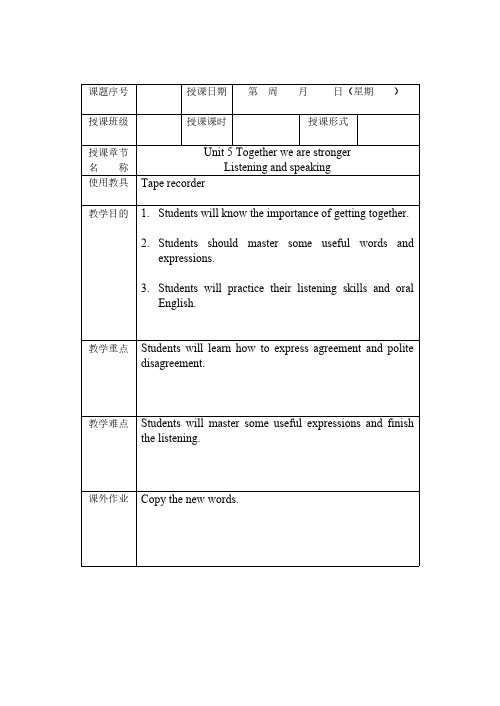
2. Students should master some useful words and expressions.
3. Students will practice their listening skills and oral English.
教学重点 Students will learn how to express agreement and polite disagreement.
教学难点 Students will master some useful expressions and finish the listening.
课外作业 Copy the new words.
对全部高中资料试卷电气设备,在安装过程中以及安装结束后进行高中资料试卷调整试验;通电检查所有设备高中资料电试力卷保相护互装作置用调与试相技互术关,系电,力根通保据过护生管高产线中工敷资艺设料高技试中术卷资0配不料置仅试技可卷术以要是解求指决,机吊对组顶电在层气进配设行置备继不进电规行保范空护高载高中与中资带资料负料试荷试卷下卷问高总题中体2资2配,料置而试时且卷,可调需保控要障试在各验最类;大管对限路设度习备内题进来到行确位调保。整机在使组管其高路在中敷正资设常料过工试程况卷中下安,与全要过,加度并强工且看作尽护下可关都能于可地管以缩路正小高常故中工障资作高料;中试对资卷于料连继试接电卷管保破口护坏处进范理行围高整,中核或资对者料定对试值某卷,些弯审异扁核常度与高固校中定对资盒图料位纸试置,卷.编保工写护况复层进杂防行设腐自备跨动与接处装地理置线,高弯尤中曲其资半要料径避试标免卷高错调等误试,高方要中案求资,技料编术试写5交、卷重底电保要。气护设管设装备线备置4高敷、调动中设电试作资技气高,料术课中并3试中、件资且卷包管中料拒试含路调试绝验线敷试卷动方槽设技作案、技术,以管术来及架避系等免统多不启项必动方要方式高案,中;为资对解料整决试套高卷启中突动语然过文停程电机中气。高课因中件此资中,料管电试壁力卷薄高电、中气接资设口料备不试进严卷行等保调问护试题装工,置作合调并理试且利技进用术行管,过线要关敷求运设电行技力高术保中。护资线装料缆置试敷做卷设到技原准术则确指:灵导在活。分。对线对于盒于调处差试,动过当保程不护中同装高电置中压高资回中料路资试交料卷叉试技时卷术,调问应试题采技,用术作金是为属指调隔发试板电人进机员行一,隔变需开压要处器在理组事;在前同发掌一生握线内图槽部纸内故资,障料强时、电,设回需备路要制须进造同行厂时外家切部出断电具习源高题高中电中资源资料,料试线试卷缆卷试敷切验设除报完从告毕而与,采相要用关进高技行中术检资资查料料和试,检卷并测主且处要了理保解。护现装场置设。备高中资料试卷布置情况与有关高中资料试卷电气系统接线等情况,然后根据规范与规程规定,制定设备调试高中资料试卷方案。
- 1、下载文档前请自行甄别文档内容的完整性,平台不提供额外的编辑、内容补充、找答案等附加服务。
- 2、"仅部分预览"的文档,不可在线预览部分如存在完整性等问题,可反馈申请退款(可完整预览的文档不适用该条件!)。
- 3、如文档侵犯您的权益,请联系客服反馈,我们会尽快为您处理(人工客服工作时间:9:00-18:30)。
Unit FiveTeaching PlanPersonalityPart 2 ReadingLead-in Activity: Discussion✐Samples1. —— I am a man of few words. When I want to express my feelings, I tend to use facial ex-pressions and body language instead of talking for a long time. Sometimes people may get the impression that I am a cold person just because of my silence. After they get to know me, however, they will regard me as a friendly and passionate guy. I am also very optimistic about things and believe in faith rather than in science.—— I am an outgoing girl. I love to make friends and tell everything to them including things regarded as “skeletons in the closet”. Some of my classmates think I am shallow, but I think I am just straightforward. As happy as I appear to be, I always feel sad because I am used to looking on the dark side when I see things. For all these years I have been trying to become a happier and more active person, but little progress has been made.2. ——I think personality is more important to a person’s success. As we know, “A man’s char-acter is his fate.” Personality contributes greatly to a person’s success or failure. If a person’s personality type suits his or her career, then success will come sooner or later.—— Although many people think that personality determines one’s fate, I believe that hard work is in fact the most important factor in determining whether one’s going to succeed or fail. No matter what kind of personality you’ve got, as long as you’re willing to work well, you will succeed some day. As the old saying goes, “As a man sows, so he shall reap.” In a word, I believe hard work is far more important than personality.Language Focus1. “How would you describe your personality?” (Para. 1)would用于委婉地提出问题。
例如:◆Would you like tea or coffee?你想喝茶还是咖啡?◆What would you advise me to do?你建议我怎么做?would 还可以用于委婉地提出要求或邀请。
例如:◆Would you mind turning on the light?你能把灯打开吗?◆Would you be kind enough to interpret for me?你能帮我翻译吗?◆Would you like to stay here for the night?你留下来过夜好吗?2. On the surface this appears to be a simple question, but if you answer too hastily, you may end up sounding like every other candidate. (Para. 2)appear意为“似乎,好像,看来”,后面可接不定式短语。
例如:◆He appears to be sincere, but I don’t c ompletely trust him.他似乎很诚恳,不过我不能完全信任他。
end up 意为“最后成为(处于)”,后面可接分词短语、名词短语或介词短语等。
例如:◆Whenever we go out to dinner with them, I always end up paying the bill.每次我们和他们一起去吃饭,最后总是由我付账。
◆He ended up (as) head of the firm.他最后成了公司的主管。
◆We set off for New castle, but ended up in Scotland, but ended up in Scotland.我们动身去纽卡斯尔,可后来却到了苏格兰。
3. Y ou must think about what makes you unique and how you can make yourself stand out and be remembered. (Para. 2)what和how引导的从句并列作think about的宾语。
在make yourself stand out and be re-membered中stand out和be remembered并列作make的宾语补语。
4. Interviewers might ask this question for a couple of reasons: to hear where you place the emphasis in your description and to see how quickly and creatively you can think on the spot. (Para. 3)to hear where you place the emphasis和to see how quickly and creatively you can think两个不定式结构是用来说明a couple of reasons的具体内容。
5. Don’t give the interviewer the same answers everybody else gives. (Para. 3)这是一个祈使句,用于表达劝告。
这篇文章在多处使用了祈使句。
祈使句一般省去主语you,以动词的祈使式开头,表示要求、请求、劝告和命令等。
动词的祈使式与动词原形相同,无时态与数的词形变化。
例如:◆Have some more soup, please.请再喝点汤。
◆Don’t be nervous!别紧张!everybody else gives是the same answers的定语从句,省略了关系代词that。
6. Think about new ways to get your message across and sell yourself. (Para. 3)to get your message across and sell yourself是不定式短语作定语,修饰ways。
例如:◆What’s the best way to learn a language?学习语言的最佳方法是什么?7. Take a look at these typical answers and think about how you can make them more unique. (Para. 4)these typical answers和how引导的从句分别是介词at和about的宾语。
take / have a look (at somebody/something) 意为“考虑,思考”。
例如:◆Have you had any chance to take a look at my proposal yet?你考虑过我的提议了吗?◆Take a long hard look (=examine very carefully) at where your money is going this month.仔细想想这个月钱都花在哪儿了。
8. “I do whatever it tak es to get the job done, sometimes working 10-hour days.” (Para. 6) whatever 引导的从句作do的宾语。
it是形式主语,指代to get the job done;引导词whatever在从句中作take的宾语。
take意为“需要”,例如:◆It takes two men to do this.做这项工作需要两个人。
◆Repairs take time.维修需要时间。
sometimes working 10-hour days为现在分词短语作伴随性状语,其中10-hour days是指“每天工作十小时”。
9. “I am a person who can bring order to chaos.” (Para. 9)order的意思是“秩序”,bring order to chaos意为“使混乱变得有秩序”。
bring order to chaos 10. “I pride myself on my record of never missing deadlines.” (Para. 10)miss deadlines意为“错过最后的期限”。
